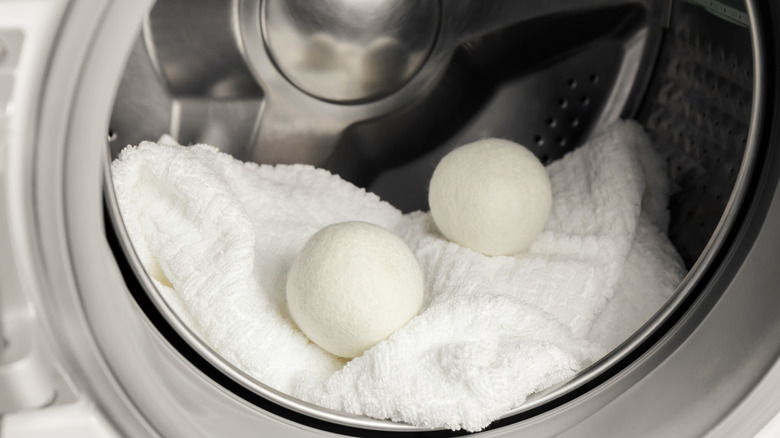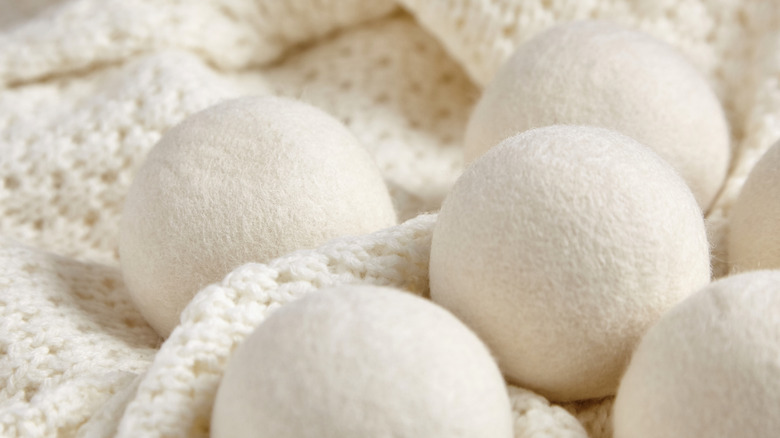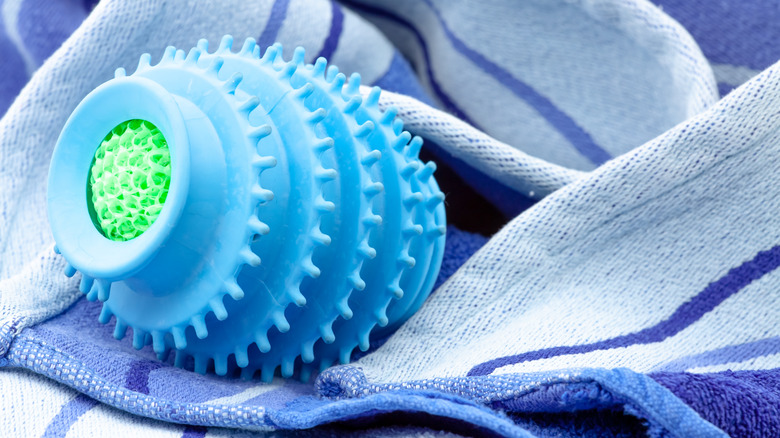Silicone Vs Wool Vs Plastic: Which Dryer Ball Material Is Best For Your Clothes?
If your clothes and linens are still damp when they come out of the dryer, before you start worrying about the quality of your appliance, consider adding one beneficial laundry accessory to the mix — dryer balls — they may just change the game for you. These helpful tools are designed to reduce the overall drying time, improve air circulation, and decrease static. Dryer balls are typically made of one of three types of material: Plastic, wool, or silicone. While plastic and silicone balls are useful, wool is typically the preferred design as it's more eco-friendly, hypoallergenic, and gentle. However, some consumers dislike how it can cause some clothing to pill, so you may want to try each one until you find your preferred material. When your dryer balls are finally used up, you can even repurpose them around your home.
If you don't have dryer balls on hand, you can also use a tennis ball as a substitute. While not a perfect alternative, tennis balls can still assist with the drying process. Note that it's recommended to use new tennis balls and that you may want to be cautious, as they can stain your light-colored items. But before you head out to purchase a supply of dryer balls, you might want to know which ones are going to be kinder to your clothes.
What's the best material choice for dryer balls?
By far the most popular option when it comes to dryer ball material is wool. It's not only eco-friendly, but it can help reduce pesky static from your finished laundry. Many wool dryer balls are made of New Zealand wool. This type of material helps to soften your clothing and is quieter during the drying cycles than other designs, like silicone or plastic. Some wool versions even come with essential oils to boost the scent of your laundry. Wool dryer balls are known for reducing overall drying time and for being gentle on sensitive skin. They're also kind on your clothes and help to smooth out wrinkles more easily.
To extend the life of the wool dryer balls, gently hand wash them with a mild detergent. However, if you prefer a non-wool option, there are other natural alternatives to wool dryer balls, including hemp and bamboo. It's also interesting to note that some consumers do complain about the wool's shorter lifespan and tendency to cause pilling in certain clothing items.
Types of dryer balls that you might want to avoid
While still effective, silicone and plastic laundry balls are not always the wisest choice. Some homeowners opt for silicone laundry balls because they are considered more durable than wool and can last for years without replacement. They can help with clothing separation and reducing the chance of creases. Compared to their plastic counterparts, silicone dryer balls are typically quieter during the drying cycle and are more efficient at softening your clothing. They're also more gentle on your clothes than the hard plastic ones. However, it's important to note that silicone is not biodegradable and is a less eco-friendly choice when compared to wool.
Plastic, though inexpensive, is probably the least popular material option when it comes to laundry balls. While, like silicone, plastic tends to be more durable, they are known to be much louder than the softer alternatives, as they bounce around your dryer. They can increase static and really don't help to soften your clothes. Plastic dryer balls are also typically less effective at fully drying your clothes, increasing your energy usage as you might have to run another cycle. Plus, plastic laundry balls are not eco-friendly or biodegradable.


